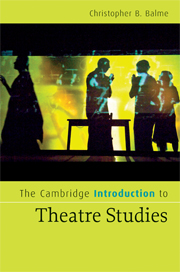Book contents
- Frontmatter
- Contents
- List of plates
- List of figures
- List of tables
- Preface
- Introduction: theatre and theatre studies
- Part I ELEMENTS OF THEATRE
- Part II SUBJECTS AND METHODS
- Chapter 4 Theories of theatre 1: historical paradigms
- Chapter 5 Theories of theatre 2: systematic and critical approaches
- Chapter 6 Theatre historiography
- Chapter 7 Text and performance
- Chapter 8 Performance analysis
- Chapter 9 Music theatre
- Chapter 10 Dance theatre
- Part III THEATRE STUDIES BETWEEN DISCIPLINES
- Notes
- Bibliography and other resources
- Index
- The Cambridge Introductions to …
Chapter 6 - Theatre historiography
Published online by Cambridge University Press: 05 February 2015
- Frontmatter
- Contents
- List of plates
- List of figures
- List of tables
- Preface
- Introduction: theatre and theatre studies
- Part I ELEMENTS OF THEATRE
- Part II SUBJECTS AND METHODS
- Chapter 4 Theories of theatre 1: historical paradigms
- Chapter 5 Theories of theatre 2: systematic and critical approaches
- Chapter 6 Theatre historiography
- Chapter 7 Text and performance
- Chapter 8 Performance analysis
- Chapter 9 Music theatre
- Chapter 10 Dance theatre
- Part III THEATRE STUDIES BETWEEN DISCIPLINES
- Notes
- Bibliography and other resources
- Index
- The Cambridge Introductions to …
Summary
Until well into the 1960s, the terms ‘theatre studies’ and ‘theatre history’ were largely synonymous, because the first and major concern of the new subject was the theatrical past. Although today theatre history is by no means the exclusive field of teaching and research, historical study remains an important area of work for scholar and student alike. In this chapter, we shall explore the most important methods and research paradigms employed by theatre historians. We shall begin by identifying the principal sources employed by historians and then move on to discuss the different types of information they provide. In the second part of the chapter, we shall address the question of periodization, i.e. the way we can divide up theatre history into epochs and periods. The third and final part of the chapter will introduce and discuss recent theoretical approaches to theatre history, which in their most extreme positions question the very idea of theatre history itself. This focus on questions of theory and methodology means that we will not be looking at specific periods of theatre history (the Greeks, the Elizabethan period, etc.) but rather at the problems involved in the writing of it, which is technically called historiography.
What then does the theatre historian deal with? The answers to this question are as divergent as the approaches that can be followed. It is certainly not the task of the theatre historian to provide a seamless narrative of theatre productions in a given period.
- Type
- Chapter
- Information
- The Cambridge Introduction to Theatre Studies , pp. 96 - 117Publisher: Cambridge University PressPrint publication year: 2008

